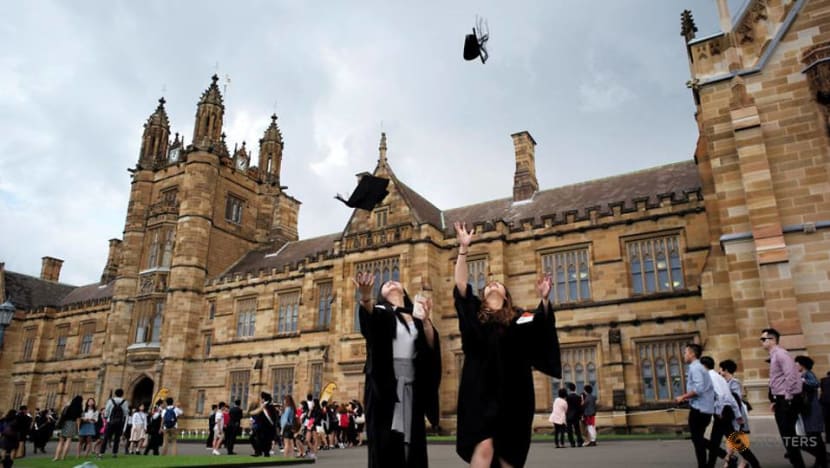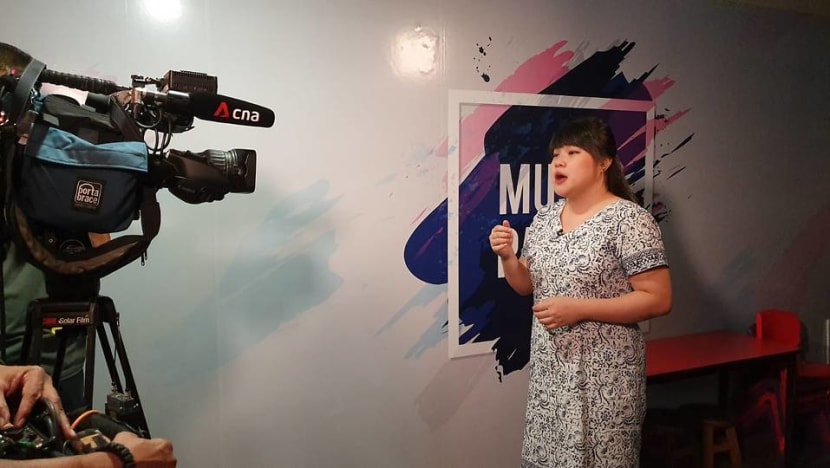COVID-19: Is it worth investing in an overseas education if school is online?
The international market for higher education is worth billions of dollars. But with borders closed because of COVID-19 and lessons moved online, some are asking whether going abroad to study still makes sense. Money Mind reports.

School of Business graduates toss their hats into the air for family members to take pictures outside the main building at the University of Sydney in Australia. (File photo: Reuters/Jason Reed)
SINGAPORE: Ms Phoebe Chee has been training as an opera singer since the age of 15.
Last year, the soprano started a degree course at the San Francisco Conservatory of Music. Midway through, however, her studies were disrupted by the COVID-19 pandemic. She is now back in Singapore and getting ready for the new academic year – online.
“Our school allows us to attend classes, because it's a hybrid model anyway. But for me I'm just a little bit afraid. I feel like, it's a little bit safer in Singapore,” said Ms Chee, who is now 22 years old.
Ms Chee is not alone in feeling this way. According to a survey by global education network QS, many international students are choosing to defer their studies to next year because of the COVID-19 pandemic.
They are doing this not just because of safety concerns, but also because of border restrictions put in place by countries around the world.

READ: COVID-19 - Australia scraps plans to allow foreign students back
Globally, there are more than 5.3 million students pursuing higher education abroad. They typically choose schools in the United States, United Kingdom, China, Canada and Australia.
The US alone is host to more than a million international students, mostly from China, India and South Korea. According to figures from the US Department of Commerce, international students contributed US$44.7 billion to the US economy in 2018.
With COVID-19 wreaking havoc on global economic activity, experts said immigration policies, the perception of safety amid the pandemic and flexibility will be key for universities to survive the downturn.
READ: COVID-19 - Most foreign students back in Singapore for university, some to continue online classes overseas
So far, online tours and webinars have become essential in how universities interact with potential candidates.
“It's efficient and effective. I think there's also going to be more in digital communication, digital content and virtual university tours so the students don't have to fly in beforehand to view a campus but can actually view it remotely,” said Mr Nunzio Quacquarelli, CEO of QS.
Tsinghua University in China was among the first to switch to online teaching in February. By the end of March, almost 2,700 faculty members had delivered 4,000 online courses to 25,000 students in different time zones.
Researchers at Tsinghua University are now looking into how the faculty and student experience will define higher education in the future.
"Virtual universities ... universities in the cloud, all sorts of ideas are coming out," said Professor Hamish Coates is from Tsinghua University’s Institute of Education.
But education experts warn that while online learning can be effective in disseminating information, an overseas education is more than just about studies.
“Online learning is very functional. It can help students access materials, but some students behave very differently online than they do in the classroom. And it doesn't necessarily lead to those really important forms of transformation and development that we expect, particularly at the very top end of our professional fields, and that's where higher education is most special,” said Prof Coates.
Redesigning university education could combine online learning, industry immersion and research focus in the course of a four-year degree, said experts. Such a hybrid set-up could spur experimentation in how fees are paid and how courses are designed.
“There are models where students don't pay upfront for their education, but pay through their future earnings, said QS' Mr Quacquarelli.
"There are other models emerging where employers pay when they hire the student. And there is also the unbundling of a degree. So, it may be that you pay for part of your degree at one institution, and the balance at another institution,” he added.
READ: IN FOCUS - Graduating into a COVID-19 jobs market - short-term challenges and longer-term issues?
Certificate courses may also see a boom - leading to a rethink on whether college degrees should remain a pre-requisite for hiring.
So as online learning becomes the norm, is it still worth paying for overseas education?
“The reality is that delivering a really high quality and engaging online education isn't necessarily much cheaper than the cost of delivering a campus-based programme," said Mr Quacquarelli.
"I do think there will be the ability to offer some lower-cost incentives for study online - it may only be a 10 or 20 per cent. So, I think, student expectations need to be set that combining online and campus learning may be slightly cheaper, but not dramatically cheaper,” he added.
Prof Coates from Tsinghua University added: “We've never been properly able to price in, in a commercial sense, a higher education. And while there are many people in the world who pay a price for their education, that, of course, is just a small part of the value that they derive.
"The issue isn't so much the price of higher education because by any measure, even when it's completely overpriced, it returns enormous value to the person who partakes in it.”
For soprano Ms Chee, her tuition and other fees add up to about US$47,000. She’s got a partial scholarship, and also needs to cover her own living expenses.
“Going overseas to me is more like a privilege. An extra, on top of what I have done and experienced in Singapore. I've already invested one year into that, so quitting is really not an option.”
Being in Singapore means Ms Chee is saving on rent. But despite that, she still says - being able to return to the school’s physical campus in California will be music to her ears.
BOOKMARK THIS: Our comprehensive coverage of the coronavirus outbreak and its developments
Download our app or subscribe to our Telegram channel for the latest updates on the coronavirus outbreak: https://cna.asia/telegram












